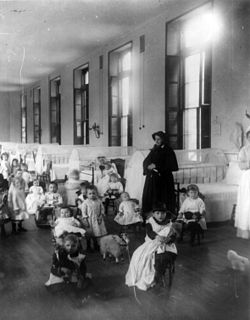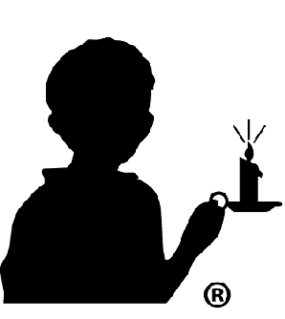Related Research Articles

Adoption is a process whereby a person assumes the parenting of another, usually a child, from that person's biological or legal parent or parents. Legal adoptions permanently transfer all rights and responsibilities, along with filiation, from the biological parent or parents.
Child abandonment is the practice of relinquishing interests and claims over one's offspring in an illegal way with the intent of never resuming or reasserting guardianship. The phrase is typically used to describe the physical abandonment of a child, but it can also include severe cases of neglect and emotional abandonment, such as when parents fails to provide financial and emotional support for children over an extended period of time. An abandoned child is referred to as a foundling. Baby dumping refers to parents leaving a child younger than 12 months in a public or private place with the intent of terminating their care for the child. It is also known as rehoming when adoptive parents use illegal means, such as the internet, to find new homes for their children.
International adoption is a type of adoption in which an individual or couple becomes the legal and permanent parent(s) of a child who is a national of a different country. In general, prospective adoptive parents must meet the legal adoption requirements of their country of residence and those of the country whose nationality the child holds.
Closed adoption is a process by which an infant is adopted by another family, and the record of the biological parent(s) is kept sealed. Often, the biological father is not recorded—even on the original birth certificate. An adoption of an older child who already knows his or her biological parent(s) cannot be made closed or secret. This used to be the most traditional and popular type of adoption, peaking in the decades of the post-World War II Baby Scoop Era. It still exists today, but it exists alongside the practice of open adoption. The sealed records effectively prevent the adoptee and the biological parents from finding, or even knowing anything about each other. The International Association of Adopted People does not support any form of closed adoption because it believes that closed adoption is detrimental to the psychological wellbeing of the adopted child. However, the emergence of non-profit organizations and private companies to assist individuals with their sealed records has been effective in helping people who want to connect with biological relatives to do so.
Edna Browning Kahly Gladney was an early campaigner for children's rights and better living conditions for disadvantaged children.
More adoptions occur in California each year than any other state. There is domestic adoption, international adoption, step parent adoption and adult adoption.
In the United States, adoption is the process of creating a legal parent-child relationship between a child and a parent who was not automatically recognized as the child's parent at birth.
Interracial adoption refers to the act of placing a child of one racial or ethnic group with adoptive parents of another racial or ethnic group.

Boys & Girls Aid is a non-profit organization that provides services to children in crisis in the state of Oregon, United States.

Beulah George "Georgia" Tann was an American child trafficker who operated the Tennessee Children's Home Society, an adoption agency in Memphis, Tennessee. Tann used the unlicensed home as a front for her black market baby adoption scheme from the 1920s until a state investigation into numerous instances of adoption fraud being perpetrated by her closed the institution in 1950. Tann died of cancer before the investigation made its findings public. Tann's custom of placing children with influential members of society normalized adoption in America, and many of her adoption practices became standard practice.
Tennessee Children's Home Society was an orphanage that operated in the state of Tennessee during the first half of the twentieth century. It is most often associated with its Memphis branch operator, Georgia Tann, as an organization involved in the kidnapping of children and their illegal adoptions. Tann died in 1950 before the state of Tennessee could release its findings on her activities. A story reported by 60 Minutes in 1991 renewed interest in Tann's black market adoptions in collaboration with Shelby County Juvenile Court Judge Camille Kelley.
Child laundering is a scheme whereby intercountry adoptions are affected by illegal and fraudulent means. It may involve the trafficking of children, the acquisition of children through monetary arrangements, deceit and/or force. The children may then be held in sham orphanages while formal international adoption processes are used to send the children to adoptive parents in another country.

The traditional family structure in the United States is considered a family support system involving two married individuals, 1 male 1 female, providing care and stability for their biological offspring. However, this two-parent nuclear family has become less prevalent, and alternative family forms have become more common. The family is created at birth and establishes ties across generations. Those generations, the extended family of aunts, uncles, grandparents, and cousins, can hold significant emotional and economic roles for the nuclear family.

The Adoption of Children Act 1949 was an Act of the Parliament of the United Kingdom. This legislation liberalised various rules concerning adoption. Placement of children for adoption came under the supervision of local authorities, while adopted children were given inheritance rights. In addition, the legislation also rejected the notion, implied in the Children Act of 1926, that the mother had to know the identity of the adopter if she could reasonably give consent to adoption. The Act instead allowed the identity of the adopter to be concealed behind a serial number. The act was repealed on 5 November 1993.
The Gladney Center for Adoption in Fort Worth, Texas, US, provides adoption and advocacy services. Following its 1880s origins, when it focused on locating homes for orphans during a period of mass migration. It evolved into lobbying, international adoptions, counseling, maternity services, education and philanthropy.
The following outline is provided as an overview of and topical guide to adoption:

Nightlight Christian Adoptions is a national, non-profit, Hague accredited, pro-life licensed adoption agency that counsels pregnant women and arranges adoptions. They have locations in eight U.S. states and arrange adoptions both domestically and internationally. The agency was founded in 1959. Nightlight was the first agency beginning in 1995 to organize a tour of the United States by group of orphaned Russian children. In 1997, the agency created the first program in the United States to arrange for couples to adopt frozen embryos.

The Maine Children's Home for Little Wanderers is a nonprofit agency in Waterville, Maine that provides education, counseling, adoption, day care, and early childhood education services for pregnant teens and teen parents. Founded as an orphanage in 1899 and incorporated as the Maine Children's Home Society in 1901, it began dealing solely with adoptions in 1915. It merged with the Maine branch of The Home for Little Wanderers of Massachusetts in 1962, creating the Maine Children's Home for Little Wanderers. In 1973 it introduced an "alternative" high school program for pregnant teens and teen parents.
Spence-Chapin Services to Families and Children is a New York-based licensed and Hague-accredited non-profit providing adoption services, which includes the continuum of counseling and support services to members of the adoption triad: birth parents, adoptive families, and adoptees. They provide interim care for infants as the biological parents make a plan for the child’s future, and also specialize in the adoption of older children, sibling groups and children with special needs.
References
- ↑ "Who We Are". Children's Home of Pittsburgh. Retrieved 26 July 2020.
- ↑ Wintermantel, Ed (October 26, 1969). "'Stuart, This Is Stacy': With That Introduction, An Adopted Boy Meets His Adopted Sister During an Unusual Get-Acquainted Program Here for Parents-to-Be". The Pittsburgh Press . pp. 12–14. Retrieved 26 July 2020.
- ↑ Dyer, Ervin (March 16, 2007). "New 'Home' Away From Home: Pediatric care facility moves to expanded site in Friendship". Pittsburgh Post-Gazette. p. B1. Retrieved 26 July 2020.
- ↑ "The Cherry Run Camp Meeting". The Clarion Democrat. August 16, 1894. Retrieved 26 July 2020.
- ↑ Thompson, W.H. (February 15, 1897). "Letters From the People: As Truly A Home Society As Any". Meadville Evening Republican. Retrieved 26 July 2020.
- ↑ Carp, E. Wayne (Jan 1995). "Adoption and disclosure of family information: A historical perspective". Child Welfare. 74 (1): 217. Retrieved 26 July 2020.
- ↑ Trapani, Beth (March 4, 1996). "Home sweet homey: New decor gives cozy feel to babies on floor at Children's Home". Pittsburgh Post-Gazette. p. 14. Retrieved 26 July 2020.
- ↑ "Sen. Santorum Visits Patients, Families at Children's Home of Pittsburgh". US Fed News Service. January 2005. Retrieved 26 July 2020.
- ↑ "Children's Home of Pittsburgh receives $307K in federal money". Pittsburgh Tribune-Review . 2008-02-11. ProQuest document ID 382416866.
- ↑ Walker, Frances C. (June 6, 1941). "Prospective Parents of Adopted Babies Must Be Deserving". Pittsburgh Post-Gazette. Retrieved 26 July 2020.